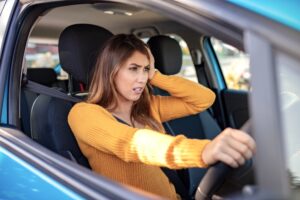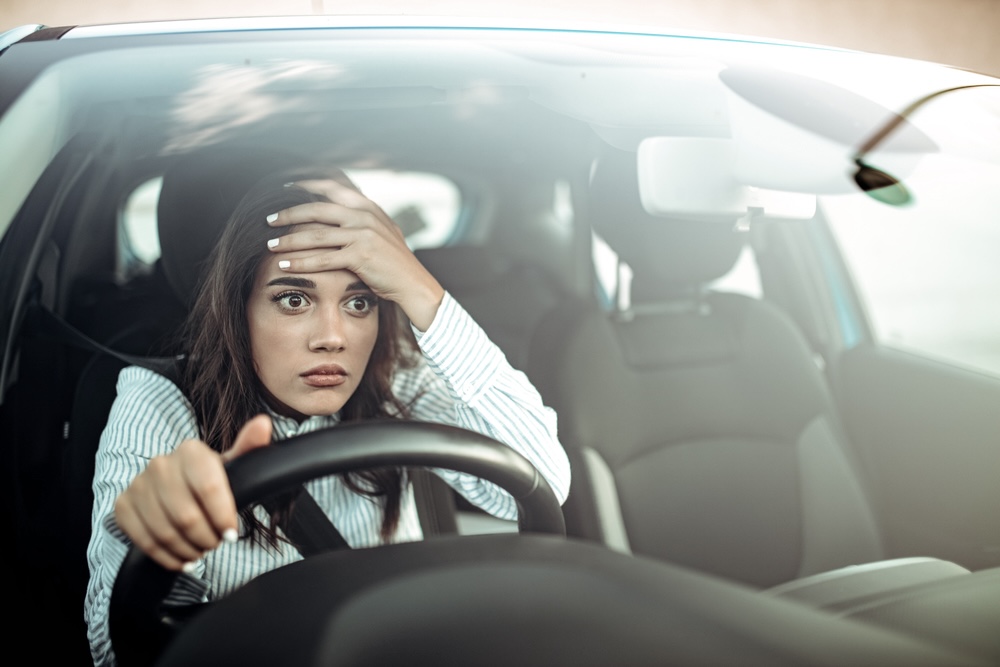You get behind the wheel of the car but even before you even start the engine, your heart starts racing and your palms start sweating. As you hit the road, you can’t help but feel anxious and overwhelmed. As you try to merge into the highway, you start panicking and your thoughts become consumed with what-ifs and worst-case scenarios. Are you going to get into a car accident? Are you going to hurt someone else? These thoughts and fears make it difficult for you to focus on the road, making driving a terrifying experience instead of a simple task.
Driving anxiety is a problem so often misunderstood, dismissed, or underestimated because, after all, driving is a basic life skill. But for those who battle the gripping fear, it can be a problem that affects their daily lives. In fact, research found that 66% of Americans struggle with driving anxiety at some point in their lives. This means that if you’re struggling with driving anxiety, you’re definitely not alone.
 What is driving anxiety?
What is driving anxiety?
Driving anxiety, also known as amaxophobia, is a type of anxiety disorder characterized by intense fear, panic, and discomfort associated with driving or being a passenger in a car. It can range from mild to severe and can manifest itself in different ways for different people.
For some, it’s the mere anticipation of a driving session that triggers panic. For others, feeling anxious about getting on the freeway or navigating a busy roundabout is a common experience for many people.
Symptoms of driving anxiety can include avoiding driving even if it’s necessary, panic attacks while driving, excessive worry, fear, sweating, trembling, rapid heartbeat, dizziness, and difficulty breathing.
There are many different factors that contribute to driving anxiety. New drivers may experience anxiety due to a lack of experience and confidence on the road. However, even seasoned drivers can suddenly develop driving anxiety due to a traumatic event, such as a car accident or a close call. Other factors that may contribute to driving anxiety include mental health issues like general anxiety disorder or PTSD.
I feel like driving anxiety is ruining my life…
If you feel like driving anxiety is ruining your life, those feelings are valid. The truth is that this type of anxiety does not only affect your driving but can also have a ripple effect on other areas of your daily life. For example, if you experience driving anxiety, you may avoid certain events or job opportunities that require driving. You may also rely heavily on others for transportation, which can be limiting and frustrating.
It can also affect social life, restricting a person’s ability to attend social events or visit friends and family who live far away. This can lead to feelings of isolation and loneliness. Even ordinary activities like grocery shopping, once effortless, turn into a daunting task.
How to manage driving anxiety
If you’re reading this, you probably want to know how to reduce anxiety when driving. There are a few strategies that can help you in overcoming driving anxiety. Depending on the extent of your anxiety, the approach may vary. Here are a few suggestions that may help:
Practice relaxation techniques
Deep breathing exercises and clearing your mind of negative thoughts can help calm you down before getting behind the wheel. You can also try progressive muscle relaxation, where you tense and relax different muscle groups in your body to release tension. This is often helpful for new drivers whose anxiety may be triggered by a lack of experience on the road.
Gradual exposure therapy
One effective way to overcome driving anxiety is to slowly expose yourself to driving situations that make you anxious. Start by taking short drives in a familiar area and gradually increase the distance or add some traffic until you feel more confident. Just make sure that you prioritize your safety by having someone with you who can take over if needed.
Avoid self-medicating
A lot of people suffering from anxiety, including driving anxiety, may feel tempted to self-medicate due to frustration. You want to calm down and the only way you think you can overcome this is to pop a pill. But what many may not realize is that doing so can even be more dangerous. Anti-anxiety pills like Xanax, for instance, are depressants so while they may calm you down, they can also affect your reflexes and decision-making skills, which are crucial for driving.
Seek professional help
In some cases, driving anxiety can be so severe that it significantly interferes with a person’s quality of life, preventing them from performing daily tasks that involve driving. When relaxation techniques and gradual exposure aren’t enough, seeking the help of a mental health professional may be necessary.
Therapies like Cognitive Behavioral Therapy (CBT) or Eye Movement Desensitization and Reprocessing (EMDR) have been proven to be effective in treating anxiety. A therapist can also help identify any underlying issues that may be contributing to the anxiety and provide personalized coping strategies.

Best mental health and addiction treatment in Lake Forest, CA
Anxiety is a serious condition that when not addressed can significantly impact a person’s quality of life. It can also cause you to turn to drugs or alcohol which can only worsen the problem. If you or someone you know is struggling with anxiety and addiction, it’s important to seek professional help from a reputable treatment center.
At Zoe Behavioral Health, we provide expert mental health and addiction treatment in Lake Forest, CA. Our team of licensed professionals is dedicated to helping individuals overcome their anxiety and achieve lasting recovery from addiction.
